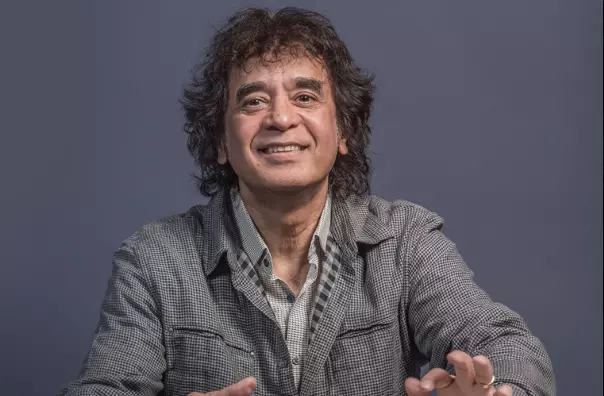
Tabla maestro Zakir Hussain passes away at 73
Hussain died due to complications arising out of idiopathic pulmonary fibrosis and had been hospitalised for the last two weeks Known for redefining the role of the tabla in global music, Hussain was honoured with three Grammys in 2024

Zakir Hussain, the legendary tabla virtuoso who transformed the perception of Indian classical music on the world stage, passed away in the United States on Sunday (December 15) at the age of 73.
PTI said his family confirmed his death on Monday.
Hussain died due to complications arising out of idiopathic pulmonary fibrosis, according to his family, the report said.
He had been hospitalised for the last two weeks and was later taken to the ICU as his condition deteriorated.
The news of his death, earlier confirmed by his friend and flautist Rakesh Chaurasia, has sent shockwaves through the global music fraternity, with artists, composers, and admirers mourning the loss of a visionary who made the tabla a universal vocabulary.
Prodigy from outset
Born in 1951 to the illustrious tabla exponent Ustad Alla Rakha, Zakir Hussain was a prodigy from the outset. By the age of 12, he was already touring internationally, and his performances quickly garnered attention for their precision and emotional intensity. Over the decades, he collaborated with global icons such as John McLaughlin, George Harrison, Yo-Yo Ma, and Bela Fleck. In February this year, he became the first Indian to win three Grammy Awards in a single ceremony, bringing his total Grammy count to four out of seven nominations. His accolades came in diverse categories, underscoring his versatility as a musician.
Watch | The history of Grammy-winning Indian fusion band Shakti
At the 66th Grammy Awards, Hussain was among the winners in the Best Global Music Performance, Best Contemporary Instrumental Album and Best Global Music Album categories. Hussain and Chaurasia won the award in the Best Global Music Performance for their song Pashto; it featured American musicians Bela Fleck and Edgar Meyer. Hussain’s supergroup Shakti, which was formed by violinist L Shankar, percussionist Vikku Vinayakram, and British guitarist John McLaughlin, and includes vocalist Shankar Mahadevan, also won Best Global Music Album for This Moment. Hussain’s trifecta of victories also included an award for best contemporary instrumental album for As We Speak, along with Chaurasia, American banjo player Bela Fleck and American bassist Edgar Meyer.
Composer, innovator, collaborator
While many classical musicians remain entrenched in tradition, Hussain was a revolutionary. He made the table speak. His collaborations with John McLaughlin in Shakti remain one of the most iconic cross-genre partnerships in music history. Combining Carnatic, Hindustani, and jazz influences, Shakti redefined ‘fusion’ for future generations.
Hussain’s work with Yo-Yo Ma’s Silk Road Ensemble expanded his creative universe. Their concerts often featured pieces that brought together the sounds of Chinese erhu, Persian kamancheh, and Indian tabla, weaving stories of migration, tradition, and cultural confluence. Critics hailed him as a “bridge-builder” whose art dissolved the artificial distinctions between ‘classical’ and ‘contemporary.’
In addition to his musical collaborations, Hussain was also a film composer and actor. He scored music for films like Heat and Dust (1983) and Mr. and Mrs. Iyer (2002), and his role in the film The Perfect Murder (1988) showcased his understated charisma on screen. His music production for Hollywood and Indian films further expanded his artistic footprint. Interestingly, he also played a cameo in the Tamil movie, Thanduvitaen Ennai (1991).
Global ambassador of Indian classical music
Zakir Hussain's contributions to the world of music were recognised with India’s highest civilian honours — the Padma Shri (1988), Padma Bhushan (2002), and Padma Vibhushan (2023) — a rare triple distinction few artists achieve in their lifetime. In 1999, he was awarded the United States’ prestigious National Heritage Fellowship, the highest honour bestowed upon traditional and folk artists in the country.
Also read: Mulayam, SM Krishna, Zakir Hussain, Sudha Murty get Padma awards
His influence was further solidified through his appointment as a visiting faculty member at prestigious universities like Stanford, Princeton, and the University of California, Berkeley. His lectures on the science of rhythm and the philosophy of sound attracted scholars and musicians from diverse fields, reinforcing his status as a global ambassador of Indian classical music.
Zakir Hussain’s life was a testament to the belief that music knows no borders. He not only carried forward the legacy of his father, Ustad Alla Rakha, but expanded it in ways that would have been unimaginable a century ago. Today, his rhythms reverberate in the music of a new generation of artists inspired by his groundbreaking work.

